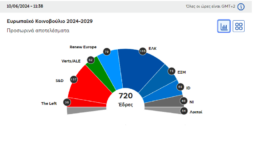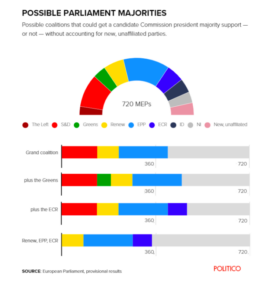Politico has distilled the conclusions of the European elections, highlighting the rise of the Far Right, the strength of the European People’s Party (EPP), and the implications for the European Parliament and the Commission.
EPP’s Victory Amid Far-Right Gains
Despite significant gains by far-right parties across Europe, the EPP emerged victorious, poised to secure around 185 MEPs, a quarter of the 720 total. While the Socialists and Democrats (S&D) maintained stability and Renew Europe suffered heavy losses, the EPP was the only centrist party to grow. Positioned as a party of industry, rural areas, and farmers, the EPP is best placed to shape EU policy, potentially negotiating with both centrist and right-wing parties.

Far-Right Surge
Far-right parties made substantial gains, with France’s National Alarm and Italy’s Brothers of Italy each capturing significant voter shares. The European Conservatives and Reformists (ECR) and Identity and Democracy (ID) groups, along with others, will hold 131 seats, exerting rightward pressure on EU politics. If unified, the far-right could become the second-largest force in Parliament, although internal rivalries make this unlikely.
Von der Leyen’s Challenge
European Commission President Ursula von der Leyen faces a narrow path to re-election. To stay in office, she must secure support from national EU leaders and Parliament, where her 2019 coalition of EPP, S&D, and Renew Europe could again offer a majority. However, the secret ballot and potential dissent within the EPP pose risks to her candidacy.

Decline of the Green Party
Despite the prominence of the Green Deal over the past five years, voters turned against eco-minded parties. The collapse of the Greens marks a significant shift in the European Parliament’s composition and policy focus.
These points reflect significant shifts in the political landscape of the European Union, with implications for future policies and leadership dynamics.
Ask me anything
Explore related questions





